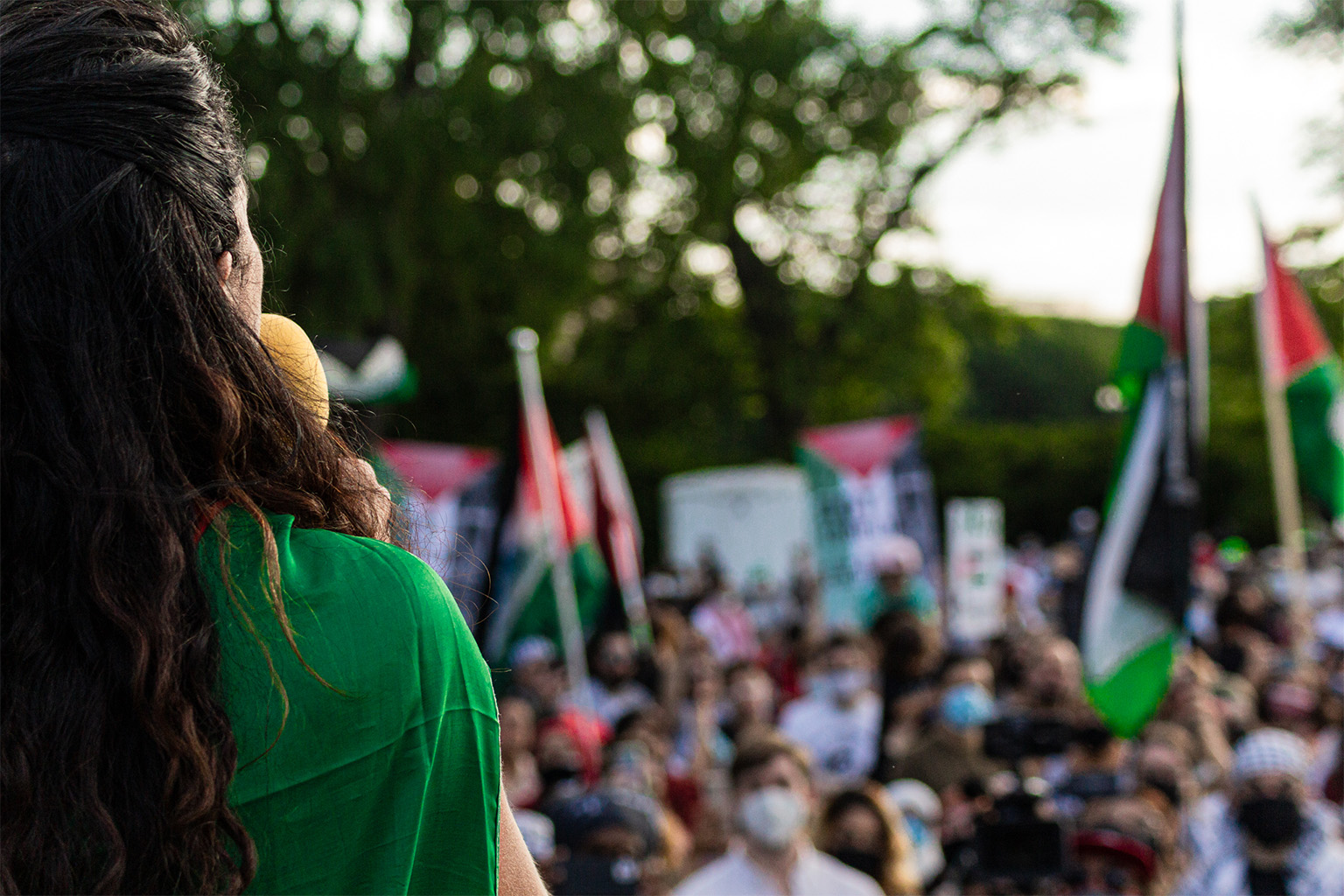Apply by April 3, 2024: USCPR Palestine Youth Organizing Fellowship

Access training, mentorship, coaching, & deep strategy support to build power for Palestine!
Since the fall of 2020, the US Campaign for Palestinian Rights has built youth organizing skills and leadership through 10 cohorts of our fellowship. We’ve helped 29 fellows nurture campaigns and tactics that translate grassroots power—local boycott campaigns, student divestment wins, and local policy changes—into change in deeply unjust federal policies. Together, we will end the federal policies that invest our tax dollars into oppression of the Palestinian people, and reinvest in community needs to build justice from the U.S. to Palestine.
Through the fellowship program, we mentor rising leaders and help nurture their local campaigns to transform U.S. policy towards justice.
Header photo by Laura Albast
Build your campaign with us via the Paid Palestine Youth Organizing Fellowship – Apply by April 3, 2024
UPDATE: Applications have now closed for the 2024 youth fellowship class.
Time frame & total stipend:
- For community-based fellows: 7 months / 35 weeks, April 17 – December 17 = $6,720 – $7,840 total stipend for a 7 month term
- For campus-based fellows: first term: 3 months / 15 weeks, April 17 – July 30; potential to renew for a second term 3 months / 15 weeks, Sept. 4 – Dec. 17 = $2,880 – $3,360 total stipend for each 3 month term
- Note: Stipends are paid out in equal installments in the first week of the fellowship and the 1st day of each month after that.
Campaign areas USCPR is equipped to support for 2024 fellows:
We’re proud to have helped nurture powerful, youth-led campaigns like Seattle End the Deadly Exchange, UT Dallas Divest from Death, and Reject IHRA Montgomery County. This year we are soliciting fellowship applications from campaigns in the following key categories:
- Strategic new campaigns, such as state-wide campus divestment, end study abroad, cultural boycott campaigns, & new boycott or divestment emerging targets
- Bold City Council campaigns that move money away from Israel, such as divestment campaigns
- Campaigns that demand federal or state politicians cut US military, financial, or diplomatic ties with Israel
- Community-driven campaigns led by Palestinian organizations
Program offerings & time commitment: USCPR offers fellows the following support structures. Fellows are expected to commit ~8 hours/week total:
- A stipend to support their local organizing. Fellows set their own hours for local organizing time.
- Zoom orientation followed by monthly Zoom workshops. [2 hours/month]
- Monthly strategy group with other organizers focused on a similar type of campaign. [1 hour/month]
- Monthly sessions from one of our 9 peer organizing coaches, along with as needed texting and call support. Peer coaches are mostly former fellows and are paid for their time. [1 hour/month]
- Regular support when you need it from your USCPR staff mentor through check-ins designed to help you structure and order your base-building, shared leadership/org development, and campaign escalation. [4 hours/month]
- Participation (or if not, recruiting other local members to participate in) the USCPR Palestine Local Campaigns Convening.
Location: Anywhere in the US, with a preference for hubs of left organizing and prioritization of the US South; all fellowship calls are all remote. Fellows will be invited to a summer in-person convening with COVID-19 safety protocols in place.
Fellow responsibilities:
- Bottomlining organizing for and building shared leadership of a local campaign that builds political power to #StopArmingIsrael, ending U.S. support for Israel’s genocide and ethnic cleansing policies against the Palestinian people.
- Setting basebuilding goals and organizing to reach them, such as getting a certain number of supporters to take an action, growing membership, strengthening leadership, and/or building membership & institutional memory structures.
- Participate in all monthly workshops and sessions (exceptions made for personal emergencies and events). Fellows grow concrete organizing skills and long-term relationships, and transfer that skill building by training your local groups.
- Uplift your work in coordination with USCPR’s comms team.
- Track your basebuilding wins, campaign escalation wins, and accomplishments for personal accountability and to support grassroots fundraising for the continuation of the program.
Qualifications: USCPR recruits a cohort of fellows across different cities. You are a good fit if you are:
- 16-35 years old
- available 1st Mondays of the month 7-9pm ET / 4-6pm PT
- passionate about learning from organizers in other communities
- part of an org or group that’s running a local Palestine campaign with a long-term goal to #StopArmingIsrael & free Palestine
- Committed to an abolitionist vision of the future, in which Palestinian people, Black people, brown people, Indigenous people, LGBTQIA+ people, disabled people, immigrants, women, non-binary folks, and all people are free. Fellows are expected to share our commitment to collective liberation including our principles in our common principles, anti-racism principles, and gender justice principles.
UPDATE: Applications have now closed for the 2024 youth fellowship class.
Information about the program is available at: uscpr.org/youthnetwork
About the US Campaign for Palestinian Rights (USCPR)
USCPR is a political home for all who believe that freedom for the Palestinian people is an integral part of achieving our collective liberation. We provide resources and strategic support to the U.S.-based Palestine solidarity movement, channeling grassroots power into positive change in U.S. policy and public opinion. We work with local organizers and activists, policymakers, movement leaders, media, and advocacy organizations to advance a rights-based, accountability and justice-oriented framework from the U.S. to Palestine.
USCPR is committed to a diversified workplace. People of color, women and GNC people, LGBTQIA people, disabled people, and people of diverse religious backgrounds are strongly encouraged to apply for the fellowship.